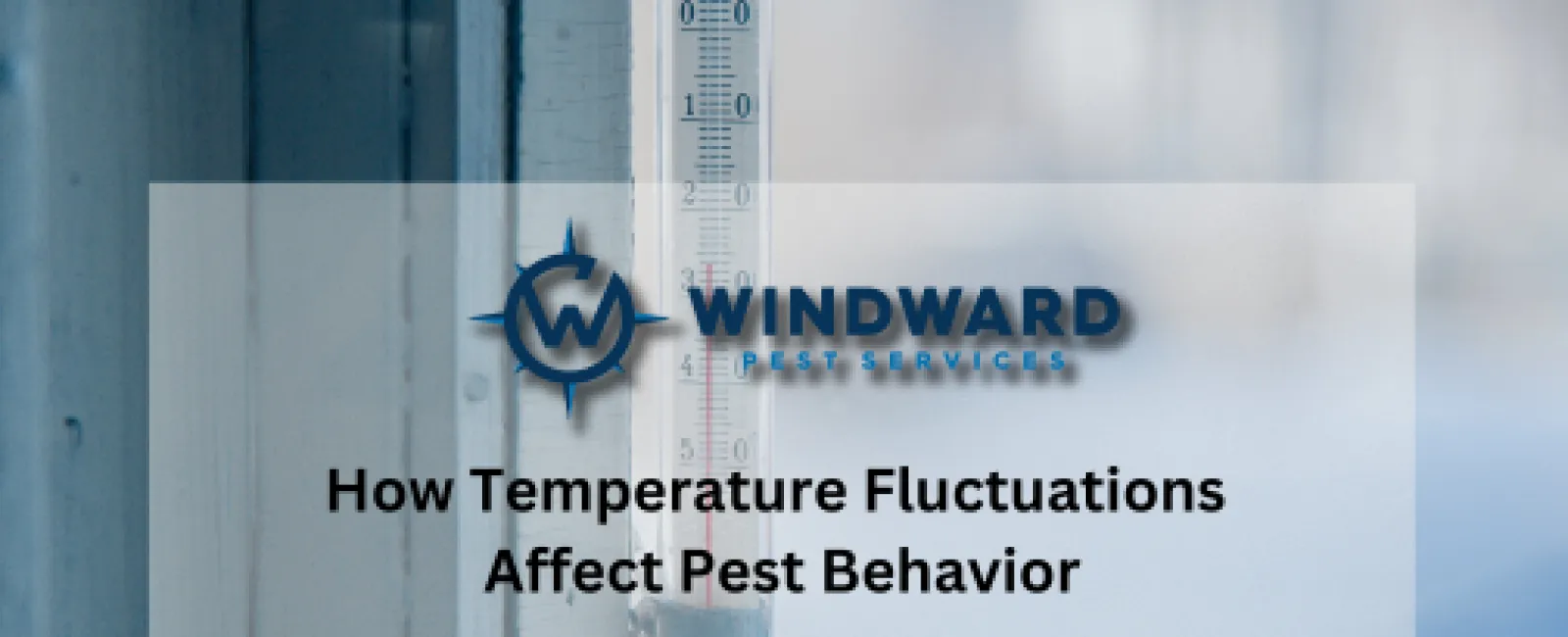As the seasons change, so do the habits of pests. Homeowners and business owners in Atlanta may notice shifts in pest activity that coincide with temperature fluctuations. Whether temperatures rise or fall, pests adapt their behaviors in response to environmental changes, often seeking food, water, and shelter in human structures. Understanding how temperature influences pest behavior is crucial for implementing effective prevention and control measures.
With Atlanta's diverse climate, pests remain a year-round concern, making professional Atlanta pest control services essential for maintaining pest-free environments. Companies like Windward Pest Services offer comprehensive solutions, including Atlanta interior and exterior pest treatments, routine pest inspections, and rodent exclusion techniques. Utilizing quarterly services helps to stay ahead of seasonal pest shifts and prevent infestations before they begin.
How Cold Weather Affects Pest Behavior
As temperatures drop in fall and winter, pests must find ways to survive. Many pests exhibit the following behaviors:
Seeking Indoor Shelter - Rodents, cockroaches, and spiders often move indoors to escape the cold. Cracks in foundations, gaps around doors and windows, and vents provide entry points into homes and businesses.
Hibernation and Dormancy - Some insects, such as mosquitoes and stink bugs, enter a state of hibernation (diapause) during cold months. However, if indoor conditions remain warm, they may become active inside homes.
Increased Rodent Activity - Mice and rats are particularly problematic in winter, as they need warm nesting sites. Without proper rodent exclusion strategies, homes can quickly become infested. Rodents can also chew through electrical wiring, insulation, and drywall, causing costly damages and even fire hazards.
Decreased Reproduction Rates - Many insects slow down their reproductive cycles in the winter months. However, species like cockroaches and rodents continue to breed indoors, where temperatures remain stable and food sources are available.
Windward Pest Services pest inspections can help identify vulnerabilities in homes and businesses that allow pests to enter during colder months, making early prevention key to pest management.
How Warm Weather Affects Pest Behavior
As temperatures rise in spring and summer, pest activity surges. Warmer conditions promote the following behaviors:
Increased Breeding and Population Growth - Many pests, including mosquitoes, ants, termites, and flies, reproduce more rapidly in warm weather, leading to larger infestations. One of the most concerning pests in the Atlanta area, termites, swarm during warm months, making proactive pest control crucial.
Higher Foraging Activity - Rodents and insects search for food more aggressively, often venturing into homes through small openings and cracks. Ants, in particular, are highly active during summer, forming extensive colonies and foraging for sustenance.
Greater Outdoor Presence - Stinging insects such as bees, wasps, and hornets thrive in warm weather, building nests in eaves, trees, and even inside attics and walls.
Increased Risk of Infestations - Warm and humid conditions encourage pest infestations, particularly in areas with high moisture levels. Homes with leaks, standing water, or poor ventilation can become prime breeding grounds for pests such as cockroaches and mosquitoes.
Atlanta interior and exterior pest treatments from Windward Pest Services can address warm-weather pest invasions and help maintain a pest-free home. Scheduling pest control treatments before peak infestation periods can reduce the likelihood of encountering large-scale problems.
The Impact of Sudden Temperature Changes on Pests
Drastic temperature shifts, such as unseasonal cold snaps or heatwaves, can also affect pest behavior. For example:
Extreme cold snaps may drive pests like rodents further indoors as they seek warmth and food sources. This can lead to an increase in rodent infestations inside homes, requiring rodent exclusion measures to prevent damage and contamination.
Heatwaves can cause ants, roaches, and rodents to seek water sources inside buildings. Kitchens, bathrooms, and basements become prime areas for these pests as they search for moisture.
Sudden humidity shifts may increase termite activity, especially in areas with existing moisture problems. Homeowners should be particularly vigilant about signs of termite damage and take preventive action before infestations spread.
Quarterly services from Windward Pest Services ensure that Atlanta homes and businesses remain protected year-round, adapting to pest behavior changes caused by fluctuating temperatures. With regular inspections and treatments, property owners can mitigate the risks associated with unexpected weather changes.
Preventing Pest Infestations Through Seasonal Pest Control
The best approach to pest control is proactive prevention. Homeowners should implement the following strategies:
Seal Entry Points - Close gaps around doors, windows, and utility openings to prevent pests from entering.
Eliminate Food Sources - Store food in airtight containers and clean up spills immediately. Keep pet food sealed and avoid leaving food out overnight.
Reduce Moisture - Fix leaks, improve drainage, and use dehumidifiers to discourage pest infestations. Addressing standing water can also prevent mosquito breeding.
Maintain Landscaping - Trim back trees and shrubs that provide access to roofs and walls. Overgrown vegetation can serve as a bridge for pests to enter homes.
Schedule Regular Pest Inspections - Routine Windward Pest Services pest inspections can help identify and mitigate pest threats before they become severe.
The Importance of Professional Pest Control
While DIY pest control methods can help, professional Atlanta pest control services provide more comprehensive and long-term solutions. Windward Pest Services offers tailored treatments, including Atlanta interior and exterior pest treatments, rodent exclusion, and seasonal pest prevention plans.
Thorough Inspections - Experts can identify entry points, nesting sites, and environmental conditions that encourage infestations.
Customized Treatments - Pest control professionals use targeted strategies to eliminate specific infestations with minimal impact on residents and pets.
Long-Term Prevention - Quarterly services help maintain a pest-free home throughout all seasons. By implementing consistent pest control measures, homeowners can avoid recurring infestations.
Stay Ahead of Seasonal Pest Changes
Temperature fluctuations significantly impact pest behavior, influencing their movement, breeding cycles, and survival strategies. Homeowners in Atlanta must be aware of these changes and take proactive steps to prevent infestations. Windward Pest Services offers expert Atlanta pest control solutions, including comprehensive interior and exterior pest treatments, rodent exclusion techniques, and thorough pest inspections.
By utilizing quarterly services and maintaining preventative measures, homeowners can effectively manage pest activity and ensure a safe, pest-free environment. Seasonal pest control is essential in keeping homes and businesses protected year-round. Preventative action is always more effective than reacting to an infestation after it has already taken hold.
Don't wait for pests to become a problem—contact Windward Pest Services today to schedule an inspection and learn how to safeguard your home against seasonal pest threats. Their professional team is ready to provide expert guidance and long-lasting pest control solutions tailored to Atlanta's unique climate and pest challenges.

